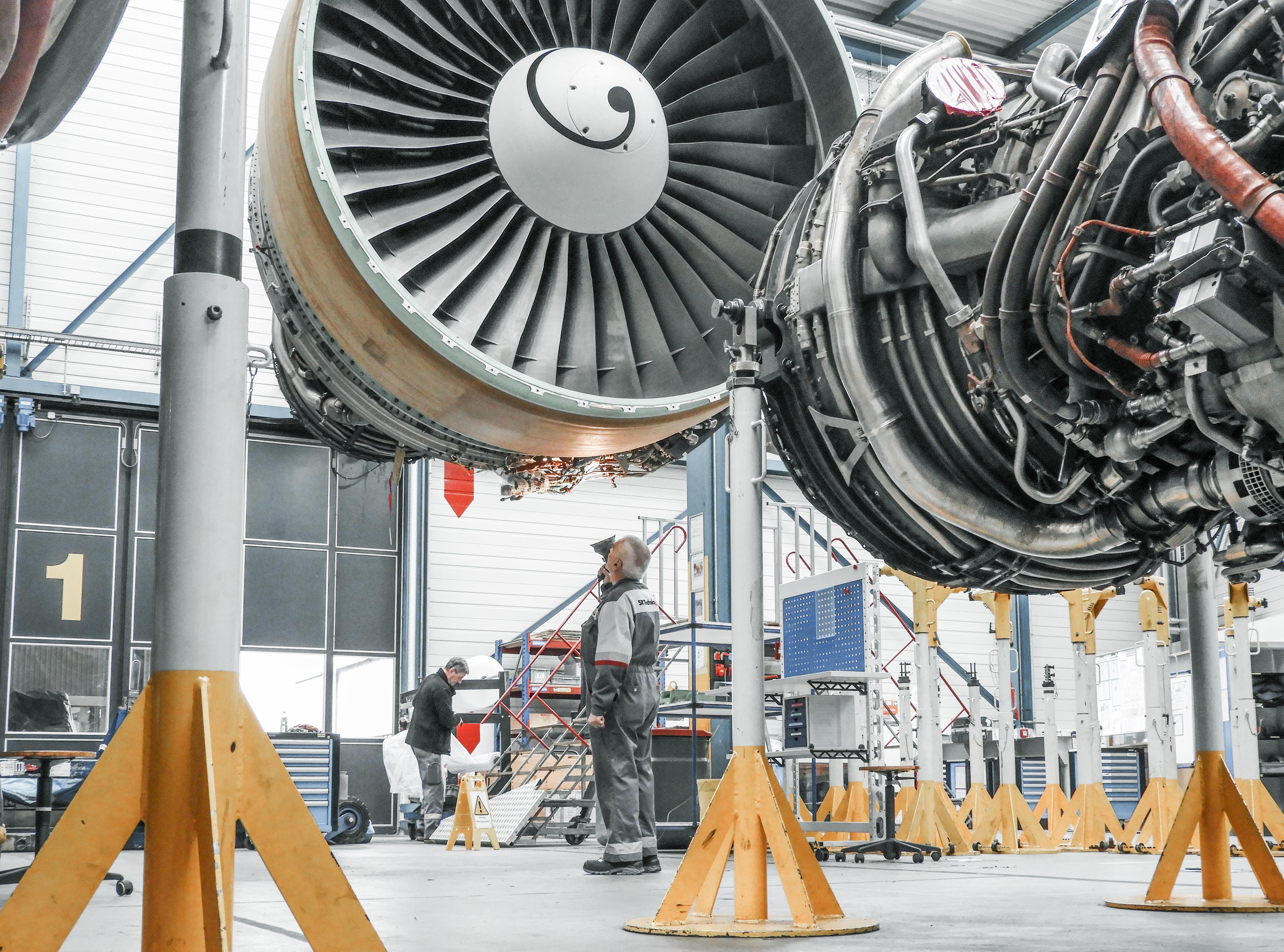エンジン整備事業の見通し:ワイドボディ機向けは減少、オンサイト整備は好調

新型コロナウィルスのパンデミックは航空業界に大混乱をもたらしており、今年の民間機向けMRO(メンテナンス・修理・オーバーホール)事業のドル建て需要は、Aviation Week Networkがコロナ危機以前に予測した規模よりも25~30%の減少が見込まれている。これは2020年のマーケット規模が912億ドルから640~730億ドルに減少することを意味しており、当社の新しい予測によれば、このうちエンジンメンテナンスが42%を占めている。
今回のコロナ危機は、2001年の9.11同時多発テロ、2008年のリーマン・ショックおよび新型インフルエンザ以上に、航空会社やアフターマーケット業界に大きな影響を及ぼすと思われるが、こういった過去の危機と同様に、アフターマーケット需要が回復する前に旅客数が先に回復すると考えられている。
現在、約8,000機の航空機が地上駐機されており、これはコロナ危機以前に運航されていた機体の1/3にあたる。エンジンのOEM企業は、新規製造とアフターマーケットの両面から痛手を受けている。
GEとSafranのジョイントベンチャーであるCFM International社は「世界のCFMエンジン搭載機の約1/3はGEとSafran Aircraft Enginesで整備を受けている。両者とも、今後数ヶ月で予想されるMRO需要の減少に向けて対応を進めているところだ」と述べている。
GE Aviation社では、MRO事業に携わる従業員の半数を90日間、一時解雇する。その理由はメンテナンス需要が減少しているためで、アメリカ以外の工場においても同様の措置が取られると予想されている。
ロールスロイス社では「必要不可欠な活動」を行う施設を除き、民間航空機向け施設を3月27日からの1週間、閉鎖している。
Bernstein社のアナリストが4月2日に立てた予測によると、ナローボディ機よりもワイドボディ機のエンジン市場が大きなダメージを受ける。なぜなら、地上駐機されているボーイング747や757、古いエアバスA330などは、もう運航に戻ることはないからだ。これはプラット&ホイットニーPW4000、GEのCF6-80C2、ロールスロイスRB211やトレント700等のエンジン整備事業がリスクに晒されることを意味する。ただし、「旅客機以外(貨物機や軍用機)の動向によっては、ある程度影響を緩和することができるだろう」とも付け加えている。
Lufthansa Technik社も、旅客機に搭載されているエンジンの方が、貨物機のそれよりも大きな影響を受けるであろうことを認めている。同社のエンジン部門を統括するDietmar Focke氏は、「当社のエンジン工場では作業待ちのエンジンを保管しておくようなことはなく、作業時間を効率的に管理することで設備コストを削減している。このため、早期から準備は進めていたが、それでもエンジン整備の部分が最初に影響を受けることになった」と述べた。
とはいえ、「フランクフルト(ドイツ)、モントリオール(カナダ)、タルサ(オクラホマ州)、深圳(中国)にある当社の出張サービス拠点は完全に稼働しており、元々は事業に対するイレギュラーな干渉と考えられていたオンサイト整備の依頼が増えている」とも同氏は語っている。
渡航制限が解除され、航空会社が自由に国内線・国際線を運航できるようになった後でも、オンサイト整備の需要は引き続き残ると同氏は予想している。「我々は必要最小限の作業工程による低コストを実現しており、工場に回航して実施する完全な整備と比べると、はるかに安上がりだ」と語った。しかしながら、このようなピンポイントの整備はエンジンを機体に搭載したまま実施できるが、完全な整備を代替することはできない。
SR Technics社もまた、顧客の航空機が駐機されている中で様々な作業の依頼を受けている。
「当社の出張チームは、駐機されている機体を飛行可能に保つための小規模なエンジンメンテナンスやチェック作業の依頼を受け、稼働が高まっている。作業内容はオイル交換、フィルター交換、エンジンのテスト運転などだ」と同社広報は語る。この数週間で、スイス、スペイン、イギリスにある同社の12ヶ所の出張サービス拠点は同様の依頼を受けている。
より全体的に見ると、運航会社は同社に対し、航空機の短期保管に備えた整備、保管終了時の確認、運航再開前の整備に関する問い合わせをする傾向にあり、駐機期間を短期にするか長期にするか、その判断を重視するようになりつつある。「リース会社からは返却時整備や駐機場、また以前発表したVirtual Table Inspection(分解されたエンジンの部品検査を遠隔で実施するサービス)の需要が高まっている」とも同社広報は付け加えた。
以上は、Lee Ann ShayがAviation Daily誌いた記事です。 Aviation Dailyは、民間航空に焦点を当てた経営幹部に重要な洞察をお伝えいたします。航空会社と空港の戦略、主要航空会社のデータスナップショット、運賃データ、および国際的なカバレッジを毎日お届けいたします。 Aviation Dailyをもっと知りたい場合、こちらをクリックして下さい。
The COVID-19 pandemic is wreaking havoc on the airline industry, which could result in the commercial aviation MRO market dollar demand declining 25-30% this year, compared to what Aviation Week Network forecasted before the outbreak. This means the market demand will decrease from $91.2 billion to $64-73 billion in 2020, when looking at potential scenarios, with engine maintenance comprising 42% of it, a newly revised Aviation Week forecast projects.
Even though the novel coronavirus pandemic will likely be far more devastating to the airline and aftermarket industries than the aftermaths of the Sept. 11, 2001, terrorist attacks in the U.S., the 2008 global financial crisis and H1N1 swine flu pandemic, collective wisdom pegs airline traffic to pick up before the aftermarket recovers, similar to previous economic disruptors.
Right now about 8,000 aircraft are parked—about one-third of the pre-pandemic active fleet. Engine OEMs are feeling the pain, on the production and aftermarket sides.
“About one-third of the global CFM fleet is serviced by GE and Safran Aircraft Engines. Both companies have taken action in light of the anticipated reduction in MRO demand over the next several months,” says CFM International, the GE Aviation/Safran joint venture.
GE Aviation is temporarily laying off half of its U.S. MRO workforce for 90 days because of service demand reductions, and similar moves are expected in its non-U.S. shops.
Rolls-Royce closed its civil aerospace facilities except for “essential activity” from one week, from March 27.
Bernstein analysts on April 2 predicted the widebody engine market to be hit worse than narrowbodies because aircraft such as the Boeing 747, 757 and older Airbus A330s that are parked simply won’t return to service. This means engines such as the Pratt & Whitney 4000, GE CF6-80C2, Rolls-Royce RB211 and Trent 700 could face risks, although that could somewhat be “mitigated by exposure to non-passenger aircraft (ie freighters and military transport), which could be more resilient,” cites Bernstein.
Lufthansa Technik agrees that engines powering passenger aircraft will be affected more than freighters. “Lufthansa Technik never operated our [engine shop] production with backlogs,” instead focusing on “efficient wing-to-wing turnaround times to reduce asset cost. Therefore this part of the business was hit first even though we started preparations for the crisis early,” says Dietmar Focke, head of engine services.
However, Lufthansa Technik’s mobile engine services repair stations in Frankfurt, Germany; Montreal, Canada; Tulsa, Oklahoma; and Shenzhen, China are each fully operational, and “seeing requests for events that were originally planned as major interventions,” says Focke.
Even after travel bans are lifted and airlines resume flying unencumbered domestic and international networks, he predicts demand for these mobile engine services to continue. “Our small surgical procedures enable operation on lower cost basis and are significantly cheaper than full-performance restoration visits,” he says. While these targeted maintenance procedures keep engines on-wing longer, they cannot fully substitute for full shop visits.
SR Technics also is getting requests for different work scopes as customers’ aircraft are grounded.
“Our field teams are high in demand to do smaller engine maintenance checks of the parked aircraft to keep them airworthy. This could be oil changes, filter replacements, smaller repairs and engine test-runs,” says a company spokeswoman. Over the last couple of weeks, the MRO’s 12 line stations in Switzerland, Spain and the UK are also receiving tasks to maintain airworthiness.
Bigger picture, operators are contacting SR Technics about “short-term aircraft storage maintenance, out-of-storage checks and return-to-service maintenance” as they weigh whether to park aircraft short- or longer-term, says the spokeswoman. “Leasing companies are asking for repossession services, aircraft parking and the previous introduced virtual table inspection where customers can inspect their parts remotely is high in demand,” she adds.